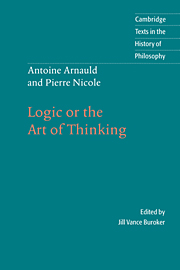Book contents
- Frontmatter
- Contents
- Acknowledgments
- Introduction
- Chronology
- Further reading
- List of works cited in the text and notes
- Note on the text and translation
- Logic or the Art of Thinking
- Preface
- Foreword
- First discourse
- Second discourse
- First part, containing reflections on ideas
- Second part of the Logic, containing reflections people have made about their judgments
- Third part of the Logic, on reasoning
- Fourth part of the Logic, on method
- Index
- Cambridge texts in the history of philosophy
Second discourse
Published online by Cambridge University Press: 05 June 2012
- Frontmatter
- Contents
- Acknowledgments
- Introduction
- Chronology
- Further reading
- List of works cited in the text and notes
- Note on the text and translation
- Logic or the Art of Thinking
- Preface
- Foreword
- First discourse
- Second discourse
- First part, containing reflections on ideas
- Second part of the Logic, containing reflections people have made about their judgments
- Third part of the Logic, on reasoning
- Fourth part of the Logic, on method
- Index
- Cambridge texts in the history of philosophy
Summary
All who share their work with the public should be reconciled to having as many judges as readers, and this should appear neither unjust nor onerous. For genuinely disinterested authors give up rights of ownership in publishing their writings, and they will thenceforth consider them with the same indifference they bring to the works of others.
Authors can reserve for themselves only the right to correct whatever is defective, for which various criticisms of books are extremely helpful. They are always useful when they are fair, and they cause no harm when they are unfair because one may ignore them.
Prudence will have it, however, that we occasionally accommodate ourselves to criticisms that do not seem fair, because even if they do not show that what is faulted is bad, they at least show that it is not congenial to the minds of those who criticize it. Now it is doubtless better, whenever we can do it without falling into some greater difficulty, to try to be so just that in satisfying judicious persons we do not displease those who have less precise judgment, since we should not assume that we will have only capable and intelligent readers.
- Type
- Chapter
- Information
- Publisher: Cambridge University PressPrint publication year: 1996



